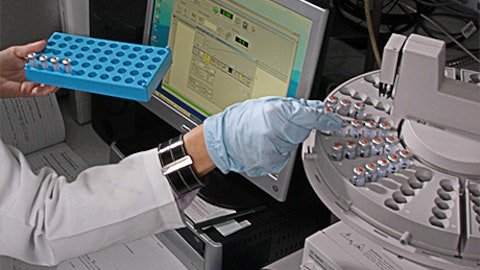Following the activity of hedge funds like Broadfin can provide many insights for smaller investors. For one thing, hedge funds looking to invest a lot of money in a company conduct thorough research into the stock, which is usually a costly process for other investors. Another point is what we have discovered by conducting an empirical analysis of hedge funds’ equity portfolios between 1999 and 2012. The studies showed that imitating a portfolio of the 15 most popular small-cap picks among hedge funds can beat the market by 1.0 percentage point per month on average. We built a strategy based on these findings and it returned 33.3% in 2012 and 53.2% and 28.2% in 2013 and 2014 respectively. By comparison, the average return of equity hedge funds amounted to 4.8%, 11.1%, and 1.4% during 2012, 2013, and 2014 respectively, while the S&P 500 ETF (SPY) gained 16%, 32.3%, and 13.5% during the same years.
Aside from Mr. Kotler’s expertise in healthcare stocks, another reason for following Broadfin’s activity is the fact that the fund has a significant exposure to small and micro-cap stocks, which, as outlined above, have more room to grow and are much cheaper and more affordable for smaller investors. For example, Broadfin’s largest stake is represented by Horizon Pharma PLC (NASDAQ:HZNP), a $2.60 billion biopharmaceutical company specialized in the development and sale of medicines for therapeutic needs in arthritis, pain, and inflammatory diseases. Broadfin owned 8.92 million shares, valued at $114.95 million as of the end of 2014. The fund first disclosed holding shares in its 13F filing for the third quarter of 2013, and since then, Horizon Pharma PLC (NASDAQ:HZNP)’s stock has been up more than fivefold. Another investor that has been bullish on Horizon Pharma PLC (NASDAQ:HZNP) is James E. Flynn of Deerfield Management, whose stake in the company was doubled during the fourth quarter to 11.70 million shares (the position is the third-largest in terms of value).
Another investment that paid off really well for Broadfin is Flamel Technologies S.A. (ADR) (NASDAQ:FLML), whose stock is up by 230% over the last three years. As of the end of 2014, Mr. Kotler’s fund held 5.15 million shares of the biopharmaceutical company, valued at $88.27 million. Last week, Flamel Technologies S.A. (ADR) (NASDAQ:FLML) released its financial results for 2014, which showed a revenue decline to $22 million from $26 million a year earlier and a significant net loss widening to $1.69 per share from $0.13. Nevertheless, analysts are optimistic about Flamel’s prospects as the stock has a consensus ‘Buy’ rating, while Leerink Swann and Roth Capital raised their price targets to $27.00 and $21.00 respectively, reiterating ‘Buy’ ratings last week. Millennium Management is another significant shareholder of Flamel Technologies S.A. (ADR) (NASDAQ:FLML), holding 1.10 million shares as of the end of 2014, up by 70% on the quarter.
Broadfin’s third largest position is also represented by a biotech company, Progenics Pharmaceuticals, Inc. (NASDAQ:PGNX). The fund owned 8.95 million shares of the micro-cap developer of oncology medicines, valued at $67.67 million at the end of 2014, and while the number of shares remained unchanged during the fourth quarter, the value of the position surged from $46.45 million from the end of the third quarter, on the back of the stock gaining 44% during the last three months of the year. Moreover, Progenics Pharmaceuticals, Inc. (NASDAQ:PGNX)’s stock has gained around 150% since the end of 2012, when the fund first disclosed holding shares of the company. For the last year, Progenics Pharmaceuticals, Inc. (NASDAQ:PGNX) posted revenue of $44 million, up from $8 million a year earlier and turned to a profit of $0.06 per share, after several consecutive years of losses. Billionaire Julian Robertson‘s Tiger Global also disclosed holding 1.29 million shares of the company in its latest 13F filing.
Disclosure: None

